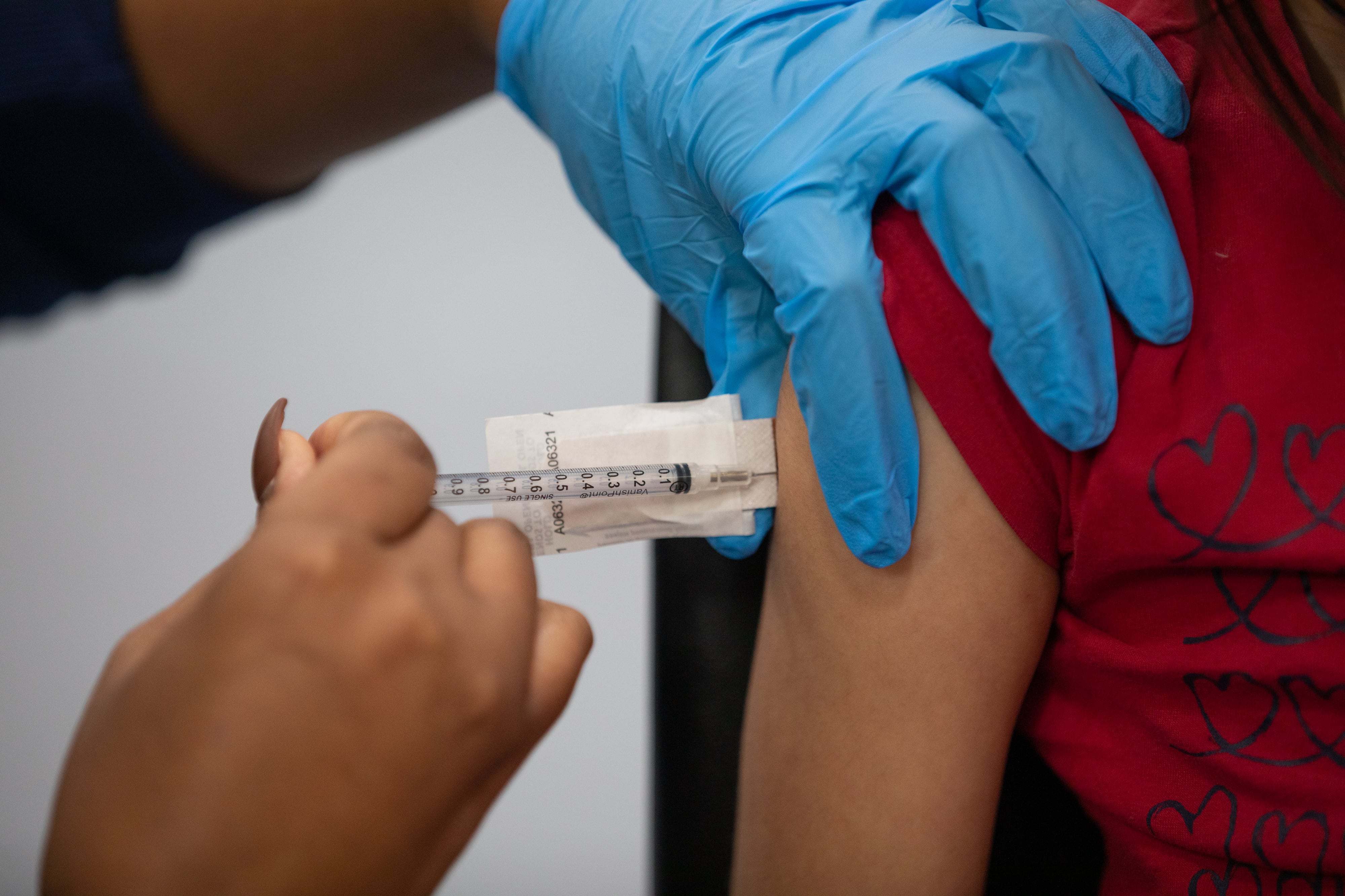At least a fourth of Tennessee counties risk outbreaks of diseases like measles, mumps, and whooping cough because more children missed their routine vaccinations during the early months of the coronavirus pandemic, data shows.
They include urban counties based in Nashville, Knoxville and Chattanooga, as well as a large swath of rural counties, especially in East Tennessee.
Memphis-based Shelby County was the only urban area to achieve at least a 95% kindergarten vaccination rate, the international threshold for preventing outbreaks of vaccine-preventable communicable diseases that also include diphtheria, hepatitis A and B, and chicken pox.
The concerning trend was highlighted to county health directors this fall in a communication from Dr. Paul Peterson, director of emergency preparedness for the Tennessee Department of Health.
In an Oct. 7 email, which Chalkbeat obtained through a public records request, Peterson encouraged health officers to examine the state’s latest report on kindergarten immunizations “so that we can work together to catch up on immunizations and help minimize vaccine preventable diseases.”
The report is the most complete data thus far about the status of Tennessee’s routine childhood vaccinations during the pandemic, when the number of shots dropped dramatically nationwide as regular doctor’s appointments and preventative health care were derailed to avoid coronavirus exposure.
Tennessee also trails most of the United States to get shots against COVID in the arms of children, teens, and adults. And the divide is especially wide for kids ages 5 to 11, with less than 7% in that age group fully vaccinated.
For routine vaccinations, Tennessee requires that children be immunized when enrolling in kindergarten. Other vaccinations are mandatory when enrolling in child care, pre-school, or pre-K, as well as the seventh grade.
The state’s immunization report for the 2020-21 school year shows 95.2% of all public and private school kindergartners were fully vaccinated.
However, the state’s analysis of county-by-county data showed that only 72 of Tennessee’s 95 counties reached the rate needed to achieve herd immunity in public schools, 15 fewer counties than the prior year.
Even fewer counties achieved herd immunity when factoring in kindergartners from private schools, which last year added more students and went from 4% to 5.2% of the state’s total kindergarten enrollment.
Dr. Morgan McDonald, deputy commissioner for population health for the department, said Tennesseans should be concerned about the vaccination lag.
“When a community drops below a 95% vaccination rate, we know their risk for outbreaks is significant,” McDonald said in an interview with Chalkbeat.
“These vaccine-preventable diseases are highly contagious. A case of measles can spread incredibly rapidly among individuals who are not vaccinated,” she said.
Measles was declared eradicated in the U.S. in 2000 thanks to widespread vaccination, but outbreaks have occurred in recent years in pockets of unvaccinated people.
In 2016 in Memphis, a measles outbreak infected seven people, six of whom had not been vaccinated. A 2017 outbreak in Minnesota sickened 79 people.
Measles is especially dangerous for young children and can lead to pneumonia, swelling of the brain, and death.
While vaccine hesitancy has been a national issue in the fight to tame COVID, the latest data on routine vaccinations suggests pandemic-related disruptions to preventative health care is the bigger issue, McDonald said.
Last school year among students who were not fully immunized, less than one-tenth of 1 percent received a medical exemption. Religious exemptions, which nearly doubled to 1.8% from 2015 to 2018, have hovered at that rate over the last three years.
Public health officials hoped for a rebound in routine vaccinations as most children returned to in-person classes this fall. In June, the American Academy of Pediatrics called on parents to get their children up-to-date.
However, in Tennessee, vaccination outreach was dialed back during the critical summer months over pushback from conservative GOP lawmakers about the state’s public health role during the pandemic. Fewer school systems offered back-to-school vaccination events in the aftermath, and the state has yet to replace its top vaccination official who was fired by Health Commissioner Lisa Piercey during the controversy. Peterson is the state’s interim director over immunization work.
Piercey has maintained the state’s immunization program was not disrupted — and that children have access to their routine vaccinations through their local health departments.
McDonald said the state has been working with the Tennessee Academy of Pediatrics, the state education department, and other community partners to ensure vaccine availability and to get the word out.
School nurses are part of that process.
In rural Haywood County near Memphis, district nurse supervisor Julie Taylor sent letters last week telling 19 families to get their kindergartners vaccinated over the holidays. If the families do not submit documentation showing vaccination, the children won’t be allowed to return to school, she said.
With 84% of its kindergarteners vaccinated last school year, Haywood County logged the state’s lowest kindergarten immunization rate.
Taylor is hopeful for improvement this year, but acknowledged the challenge.
“It all points back to COVID. It was a difficult year,” she said.
“We had a lot of COVID in households in Haywood County, and it was all-consuming for school nurses as we worked with our local health departments to provide contract tracing. We were just trying to hold on and keep our students safe and healthy from the pandemic,” Taylor said.
This year, there’s been a more concerted effort to catch students up on shots they may have missed, which Taylor said was more about pandemic-related logistical challenges than vaccine hesitancy.
“These parents aren’t bad parents. Things just fell through the cracks,” she said.
Use our table below to look up your county’s kindergarten vaccination rate.






